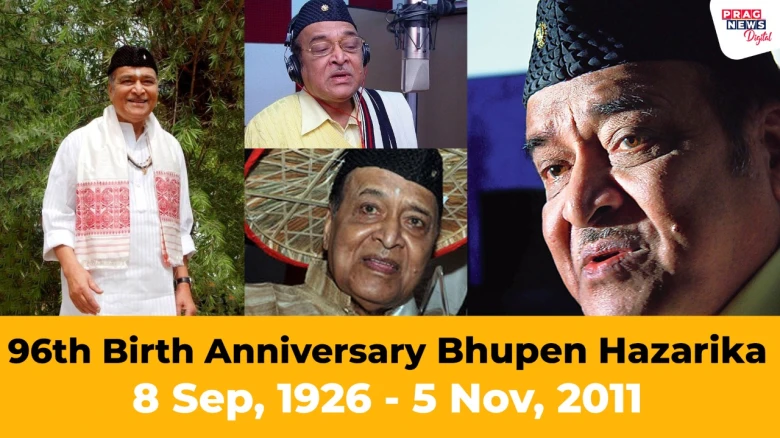Bhupen Hazarika was the Secretary of the Reception Committee for the third IPTA All Assam Conference. He worked as a teacher at the Gauhati University for a while before quitting and moving to Kolkata.
Digital Desk: Renowned music artist Bhupen Hazarika, also popularly known as ‘Sudhakantha’ was born on 8 September, 1926 in Tinsukia district, Assam. He was also known as the 'Bard of Brahmaputra' for his evergreen songs. Most of us have listened his one of the famous songs 'Dil Hoom Hoom Kare' from the film Rudaali. Without a doubt, the song was sung so beautifully and perfectly encapsulated the entire movie. It also moved the audience to tears. Let us tell you that Bhupen Hazarika himself composed the song and also lent his voice to the duet.
Bhupen Hazarika: Birth
Birth Date: September 8, 1926
Place of Birth: Sadiya a small town in Assam's Tinsukia district.
Sun Sign: Virgo
Famous as: Musician, Singer, composer, actor, journalist, author and a reputable film-maker.
Father's Name: Nilakanta Hazarika
Mother's Name: Shantipriya Hazarika
Spouse/Ex: Priyam Hazarika
Children: Tez Hazarika
Awards he was honoured with: Bharat Ratna (2019) (Posthumously), Padma Vibhushan (2012) (Posthumously), Padma Shri (1977), Dadasaheb Phalke Award (1992), Padma Bhushan (2001), Sangeet Natak Akademy Fellowship (2008), etc.
Date of Death: 5 November, 2011
Place of Death: Mumbai
Early life, family, and education of Bhupen Hazarika
Bhupen Hazarika was born in Sadiya, Assam, on September 8, 1926. His mother was Shantipriya Hazarika and his father was Nilkanta Hazarika. Among their ten kids, he was the eldest. Sonaram High School in Guwahati, Dhubri, and Tezpur High School were where he had his early schooling before graduating in 1940. He earned his Intermediate Arts degree from Cotton College in 1942, his B.A. from Banaras Hindu University in 1944, and his M.A. in Political Science from the same institution in 1946. After that, he worked for All India Radio in Guwahati where he won a scholarship from Columbia University, New York and completed his Ph.D. in Mass Communication.
His doctoral dissertation, "Proposals for Preparing India's Basic Education to Use Audio-Visual Techniques in Adult Education," was successfully completed. He also got the Lisle Fellowship from Chicago University in the United States.
Indian cinema's fore fathers is Dadasaheb Phalke
Let us remind you that during his early years, both renowned Assamese artists Bishnu Prasad Rabha and noted Assamese poet Jyotiprasad Agarwal noticed his musical talent. In 1936, he made a trip to Kolkata with his teachers to record his debut song for the Selona Company. In 1939, he performed two songs for the movie "Indramati." He composed his first song, "Agnijugor Firingoti Moi," when he was just 13 years old.
Career and Major Works of Bhupen Hazarika
Paul Robeson, a civil rights fighter, had a significant impact on Bhupen Hazarika, at Columbia University. Bhupen wrote the song "Bistirno parore," which was based on the visual and subject matter of Robeson's "Ol Man River."
Bhupen Hazarika was the Secretary of the Reception Committee for the third IPTA All Assam Conference. He worked as a teacher at the Gauhati University for a while before quitting and moving to Kolkata.
Later, he produced a number of noteworthy films, including Shakuntala Sur and Pratidhwani. "Lati-Ghati," "Chik Mik Bijuli," "For Whom the Sun Shines," and "Mera Dharam Meri Maa" are among the films he has directed.
He wrote the music and songs for a number of Assamese and Bengali films, including "Aarop," "Chameli Memsaab," and "Shimana Perye."
He was a well-known playback vocalist who provided the voice for several films, including "Era Bator Sur" and "Shakuntala Sur."
Bhupen Hazarika's most recent works include "Darmiyaan," "Gaja Gamini," and "Daman: A Victim of Marital Violence." Do you recall the title of his final picture in that capacity? Gandhi to Hitler was the phrase.
How can we overlook his significant contributions to Hindi cinema as the music director of such notable movies as "Arop," "Ek Pal," and "Rudaali". He received the "Best Music Director National Award" in 1993 for the film Rudaali.
Awards and Honors for Bhupen Hazarika
President's Medal for his 1960 films Shakuntala, Pratidhwani, and Lotighoti (1967).
He served in the Assam Legislative Assembly from 1967 to 1972.
For Chameli Memsaab, he won the National Award for Best Music Director in 1976.
He received the Padma Shri award in 1977.
He received the Arunachal Pradesh Government's Gold Medal in 1979 for his work using film to promote tribal culture and welfare.
Sangeet Natak Akademy Award in 1987
During the years 1999 to 2004, he served as the Sangeet Natak Akademy's chairman.
He also belonged to the Central Board of Film Certification and the Assam Film Development Council.
In 2003, he was chosen to serve on the Prasar Bharati Board.
In 1992, he was given the esteemed Dadasaheb Phalke Award.
He received the Padma Bhushan in 2001.
He was given the Asom Ratna honour in 2009.
Posthumously, he received the Padma Vibhushan in 2012.
In 2019, he was awarded with the Bharat Ratna posthumously.
Bhupen Hazarika was undoubtedly a man of skill who had performed in a variety of capacities in real life, including playback vocalist, director, poet, composer, journalist, etc. He was a talented student in his day who contributed to the cinema industry by writing lovely songs, lending his priceless voice, and directing films. He will always be remembered through his works and talent.





Leave A Comment